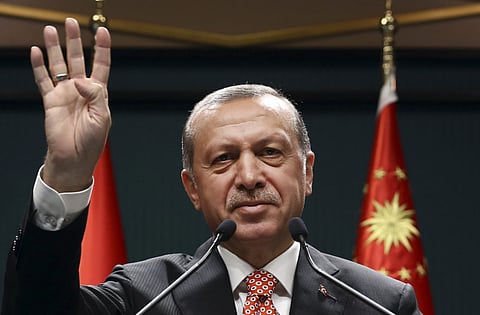Turkey needs a balancing act
The country should remain loyal to the idea propagated by Ataturk as the world wishes it security, stability and prosperity

Arab Muslims in the region found themselves unable to express their opinion regarding the shocking events in Turkey. They could not feel happy that the coup had failed and they were unable to congratulate Turkey for defending its democracy.
The entire situation was difficult for Arab Muslims. The event made them feel uneasy and puzzled and so they waited until the events unfolded and tried to ascertain which way the wind will blow — unlike the Arab media that jumped the gun and rode waves of the possible ‘exciting’ outcomes, while some of them attempted to contain their joy, only to wind up looking like fools the following day.
It is hard to forget that Turkey is a country that backed the Muslim Brotherhood in Egypt, which resulted in negative political repercussions throughout the region. The Muslim Brotherhood was banned from many Arab nations, such as Saudi Arabia and the UAE, and was also included in their list of terrorist organisations.
On the other hand, Turkey today hosts millions of Syrian and Iraqi refugees. A few months ago, it had even announced that it would selectively naturalise refugees. The refugees feel a sense of gratitude towards Turkey. After all, the United States and European nations, and wealthy countries around the world, have received only 9 per cent of the 65 million refugees.
Is Turkey on a path to creating an Arab-Islamic or Islamic-Arab division? Perhaps it is too early to say, but it’s not impossible. People started picking sides a few years ago in the region and that situation may intensify following the failed coup in Turkey. Was the Turkish response to the coup a reflection of a mature democracy that defeated a corrupt European system, only marred by the country’s military and political support for dictatorships in the Arab region and developing world? Perhaps it is. How else can one explain the delay in official statements regarding the failed coup?
Hundreds of millions of people witnessed how the “iPhone defeated the tanks” in Turkey. Regardless of the circumstances and details, this picture will live on for a very long time in peoples’ memories.
It is possible for leaders to sometimes side with enemies abroad in order to contain domestic foes. Millions of people witnessed what happened in Turkey on television and social networks, regardless of whether the coup was fabricated, to achieve political goals, or whether it was a legitimate military uprising to topple a regime that strayed from democratic values and suffered shortcomings in its foreign policy. The coup may have even been a disciplinary measure by the US against a Turkish regime that deserved it, because it discovered a political ploy that dragged it on to a bumpy road. That road may have resulted in the loss of key allies and partners, like the Gulf, Russia and the European Union, which will therefore result in Turkey losing its place as an active member of the international community.
Regardless of all the expectations, analyses, speculations and emotions involved, the Arab region and the world will be standing before a Turkey that is different on so many levels, particularly at the level of foreign affairs. This is important for Arabs. But more importantly, what do Arabs want from the new Turkey, the one that has emerged after the failed coup?
The image that accompanied Turkish President Recep Tayyip Erdogan at the press conference, following the failure of the coup, was that of Mustafa Kemal Ataturk — the founder of secular Turkey. On the other hand, on the same night when the coup attempt took place, mosques in Turkey became exceptionally active, praying to God to safeguard the Turkish government and protect its president.
Today, Arabs, Muslims and the world in general are standing by Turkey. We wish it security, stability and prosperity. Now we have only one simple wish to ask of the Turkish people, who perhaps may be able to apply pressure, regardless of who their elected president is. And that wish, first and foremost, is to ensure the mid-term and long-term interests of Turkey and those of Arabs, Muslims and others. Second, Turkey should remain loyal to the idea of secularism and modernity propagated by Ataturk. The Turkish people should also continue committing themselves to the idea of a moderate and nonpartisan mosque, which the Turkish people resorted to for prayers during that terrifying night.
It seems that it is Turkey’s fate to be stuck between those two ideas: Ataturk and the partisan mosque. In fact, it is an equation that requires tremendous balancing and will contribute to making Turkey stronger and enhancing its relations with its neighbours and the world.
This balance, whenever it may occur, will be a source of great joy, as Ataturk’s secular principles and the idea of a moderate and nonpartisan mosque will guarantee Turkey’s departure from the notion of ‘authoritarianism’ when it comes to its relations with its people.
Mohammad Hassan Al Harbi is a columnist and author.



